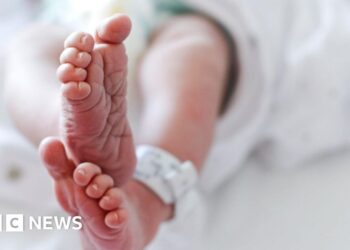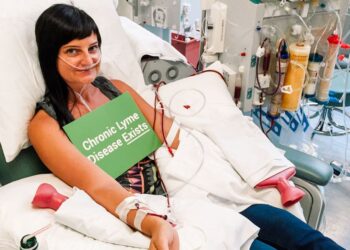Universal skin decolonisation of patients admitted to intensive care units (ICUs) may not improve infection control. New research led by the University of Aberdeen indicated that it might increase methicillin-resistant Staphylococcus epidermidis (MRSE) bloodstream infections in vulnerable patients.
Hospital-associated infections cause significant morbidity and mortality, with critically ill patients in ICUs at particularly high risk. Surveillance figures from English ICUs show an ICU-associated bloodstream infection rate of 3.5 per 1000 bed-days for stays of 2 nights or more in the year to March 2024. Over 25% of patients with these infections die within 30 days.
Reasons for the increased infection rate in ICUs include high antibiotic use leading to significant skin flora colonisation by resistant bacteria. Invasive procedures including indwelling catheters and the insertion of intravascular devices are independently associated with methicillin-resistant S aureus (MRSA) colonisation and infection.
Need for a New Infection Control Approach
Decolonisation protocols were introduced in the 1990s to curb rising nosocomial infections due to MRSA. Nationwide infection control programmes since the mid-2000s led to sharp declines in MRSA rates in NHS hospitals over the next decade. One UK-wide study in ICU patients between 2007 and 2016 showed a 78% decrease in bloodstream infections overall and a 97% reduction in MRSA bloodstream infections.
However, data from the National Institute for Health and Care Research show this decline plateaued after 2012. Rates have subsequently been largely static, suggesting the need for a new approach.
Routine ICU decolonisation typically involves chlorhexidine skin disinfection combined with nasal mupirocin. The Aberdeen team noted conflicting evidence on chlorhexidine’s effectiveness. They also raised concerns that biocide skin and mucous membrane decolonisation might lead to reduced susceptibility to chlorhexidine and selection for multidrug-resistant pathogens.
Study Compares Universal and Targeted Decolonisation
The researchers compared universal vs targeted skin and nasal decolonisation in ICU patients at two Scottish hospitals in adjacent health boards with different protocols. The study included patients aged 16 years or older and admitted between 1 July 2009 and 28 February 2022.
One hospital switched from universal decolonisation of all admissions to targeting only MRSA carriers from 1 February 2019. The other hospital used targeted decolonisation throughout. The researchers analysed rates of S epidermidis bloodstream infections and tested MRSE and chlorhexidine susceptibility.
Results Show Benefits in Reducing Resistant Infections
The results, published in The Lancet Microbe, showed that S epidermidis was identified in 334 (45%) of 735 bloodstream infections in the hospital that de-escalated decolonisation. Of these, 197 occurred before de-escalation. Overall, bloodstream infection rates did not increase after de-escalation.
However, MRSE infections declined significantly after the switch, from 10.4 to 4.3 cases per 1000 occupied bed-days. The probability of MRSE among infections fell from 89.2% to 56.7%.
By contrast, the control hospital reported 167 (60%) S epidermidis bloodstream infections among 278 total, with no significant changes in infection rates or MRSE incidence.
Genetic analyses revealed that de-escalation was linked to fewer bloodstream infections caused by multidrug-resistant S epidermidis strains. There was reduced carriage of mobile genetic elements and genes related to multidrug resistance and biofilm production.
Balancing Benefits and Risks
“In ICU settings with low MRSA incidence, the benefits of universal decolonisation should be balanced against the risks of selecting MRSE sequence types adapted for invasive and device-associated infection,” the researchers concluded.
Professor Karolin Hijazi, chair in oral and maxillofacial medicine at the University of Aberdeen and study lead, commented in a press release: “This research essentially demonstrates that the excess use of disinfectants in universal decolonisation offered no advantage in terms of control of serious blood infections in a low MRSA ICU setting, but instead caused the unintended rise of MRSE bloodstream infections.”
Implications for Infection Control Policy
The authors recommended that hospitals consider the “unintended harms of universal decolonisation,” especially given the global rise of antimicrobial resistance. Hijazi added that such practices increase resistance risks and costs without added benefit in low-MRSA settings.
The findings should inform standardised national guidelines for effective and safe patient decolonisation, in line with the government’s 5-year action plan for antimicrobial resistance, the researchers said. They described the emergence and spread of antimicrobial resistance as a “silent pandemic” and stressed that reducing unnecessary decolonisation could help contain resistance and reduce costs.
Dr Sheena Meredith is an established medical writer, editor, and consultant in healthcare communications, with extensive experience writing for medical professionals and the general public. She is qualified in medicine and in law and medical ethics.
Source link : https://www.medscape.com/viewarticle/icu-skin-decolonisation-may-raise-resistant-infections-2025a1000gir?src=rss
Author :
Publish date : 2025-06-20 15:05:00
Copyright for syndicated content belongs to the linked Source.









